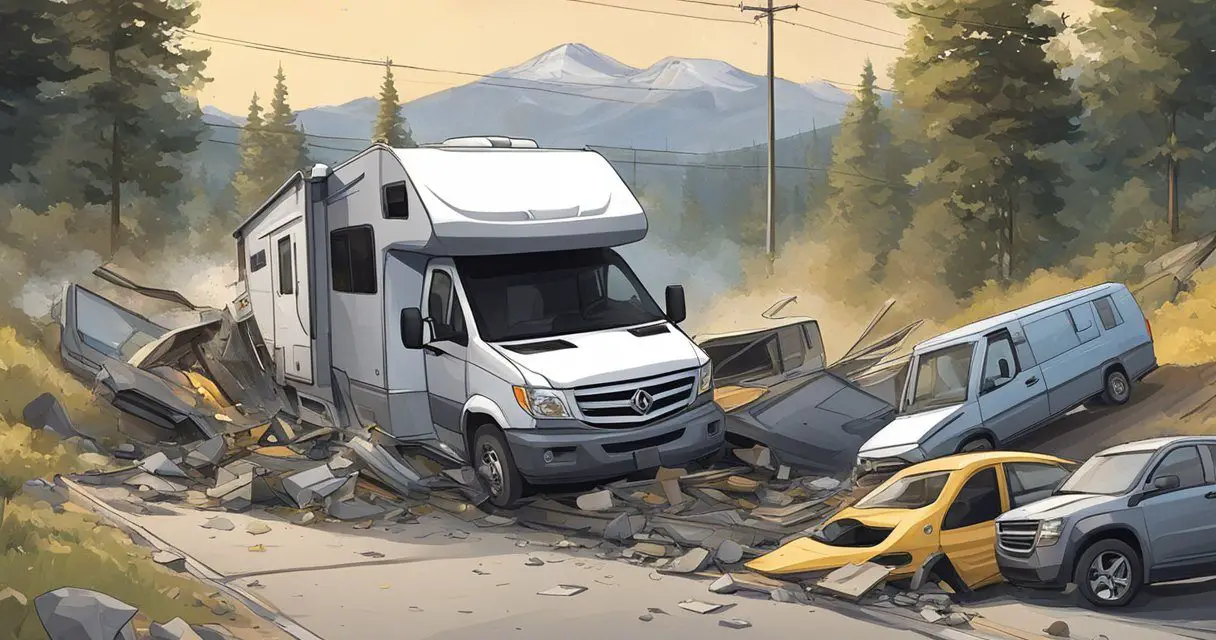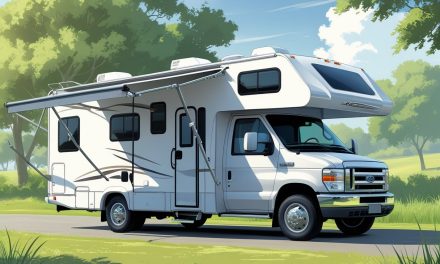Would you like to save this article?
Navigating the roads in an RV can be an exciting adventure but also presents unique challenges. While these vehicles offer the comforts of home on the open road, their size and weight can lead to specific risks that drivers must be aware of. If you’re considering a road trip in an RV, it’s essential to prepare and understand the factors that can increase the likelihood of accidents.
The key to a safe journey is understanding the common causes of RV accidents and how to prevent them. This knowledge not only ensures your safety but also enhances your overall experience by allowing you to focus on the joys of travel. By being informed and proactive, you can enjoy your time on the road with peace of mind.
1) Inexperienced Drivers
Driving an RV is quite different from driving a regular car. It’s a large vehicle, often requiring special skills and techniques to handle safely. When you’re not used to operating something this size, it can be easy to make mistakes.
You might find turning, parking, and stopping more challenging in an RV. It takes longer to brake due to the vehicle’s weight. Plus, taking wider turns is essential to avoid clipping curves or other cars.
Practice makes perfect. Spend some time getting familiar with your RV before hitting the road for long trips. Consider taking a class specifically for RV driving, which will help boost your confidence and enhance your skills.
2) Seniors Behind the Wheel
When it comes to RVs, seniors often love the freedom these homes on wheels provide. As you age, driving can become challenging. Factors like slower reaction times and vision changes might affect safety.
If you’re a senior driver, make sure you’re comfortable with your RV’s controls. Keep your skills sharp by practicing regularly and taking refresher driving courses.
Don’t hesitate to take breaks frequently during long trips. Staying well-rested and alert is key. Regular check-ups with your eye doctor can also help ensure your vision remains road-ready. It’s all about enjoying your trip with confidence and safety.
3) Reduced Visibility
Driving an RV can feel like piloting a small ship, especially when it comes to visibility. Due to their large size and unique design, RVs often come with significant blind spots. These blind spots can make it tricky to see other vehicles on the road, increasing the chance of accidents during lane changes or turns.
Unlike standard cars, RVs don’t always have the benefit of a rearview window. This lack of rear visibility means you’re more reliant on mirrors and technology, if equipped, to keep track of what’s happening around you. It’s crucial to adjust mirrors properly before hitting the road to minimize these blind spots as much as possible.
You might face challenges while driving in congested areas or on busy highways. It’s essential to stay alert and maintain a safe distance from other vehicles, which gives you more reaction time in these conditions. Practicing cautious and defensive driving helps you manage the limitations imposed by reduced visibility.
4) Handling Large Vehicles
When you’re behind the wheel of an RV, you’re dealing with a vehicle that’s way bigger than a regular car. This means it takes some getting used to. You need to give yourself plenty of time and space when making turns or changing lanes.
RVs have a higher center of gravity, which can lead to rollovers if you’re not careful. Keep your speed in check, especially around those sharp bends or when changing directions. Always remember, it’s better to be safe and take your time.
Visibility can be a challenge. Those large blind spots mean you need to be extra aware of your surroundings. Make good use of your mirrors and keep checking them frequently to ensure a smooth drive.
Practice makes perfect. Spend time getting comfortable with your RV before hitting the road for long trips. It’s all about gaining confidence and understanding how your vehicle behaves under different conditions.
5) Sharp Turns and Narrow Roads
Navigating sharp turns and narrow roads in an RV can be tricky. Because of an RV’s size and weight, these roads demand extra attention and precision. You may find that they test your driving skills, requiring you to adjust your speed and steering approach constantly.
It’s crucial to slow down when approaching sharp turns. This gives you more time to react and reduces the risk of tipping over. Staying aware of your vehicle’s dimensions can also help you avoid obstacles or drifting out of your lane.
Additionally, plan your routes ahead of time whenever possible. Some roads may be better suited for larger vehicles. Using a GPS designed for RVs can alert you to these conditions and help you choose safer paths. Always prioritize your safety and comfort when taking these challenging routes.
6) Distracted Driving
When you’re driving an RV, it’s easy to get distracted. This could be due to interactions with passengers, adjusting the radio, or glancing at a phone. Remember, even a brief distraction can lead to serious consequences.
Distractions mean taking your eyes off the road, even just for a second. With the size and weight of an RV, stopping or reacting quickly in an emergency can be difficult. You’re controlling a large vehicle, so staying focused is crucial.
To minimize distractions, set everything up before you hit the road. This includes adjusting mirrors, planning your route, and setting the radio or music. Also, utilize hands-free devices if necessary and pull over if you need to attend to something. Your full attention should always be on the road.
7) Poorly Secured Loads
Keeping your load secure is crucial when driving an RV. If your gear isn’t strapped down properly, it can shift around during transit and affect the handling of your vehicle. This can lead to accidents, especially when taking turns or coming to a sudden stop.
Properly securing items inside and outside your RV is something you’ve got to nail down before hitting the road. Make sure to use appropriate strapping or netting to keep things in place. Remember, unsecured objects can become dangerous projectiles in the event of a sudden stop.
It’s also a good idea to double-check everything before you start your journey. Take a moment to inspect how everything is packed and secured. Ensuring that your load is stable not only helps maintain the RV’s balance but also keeps you and your passengers safe.






